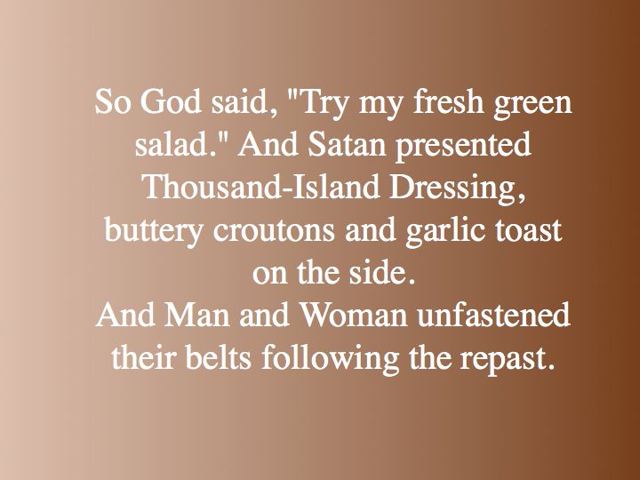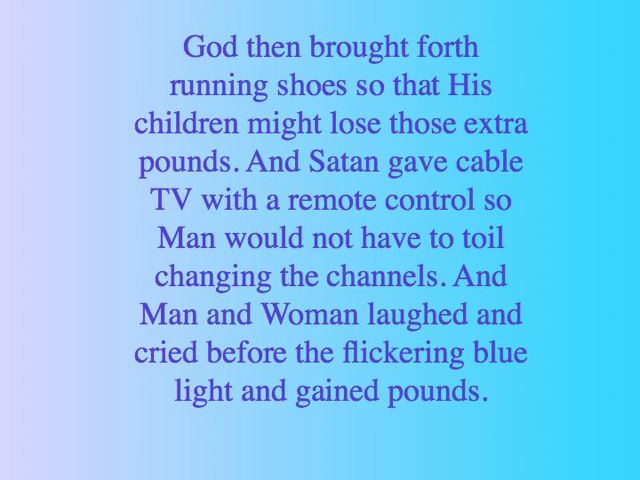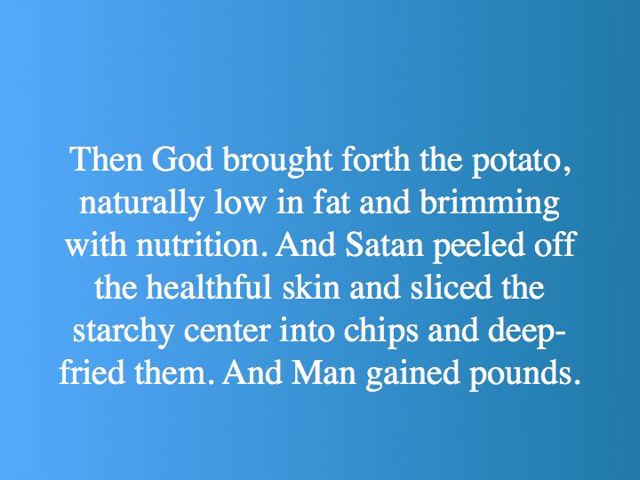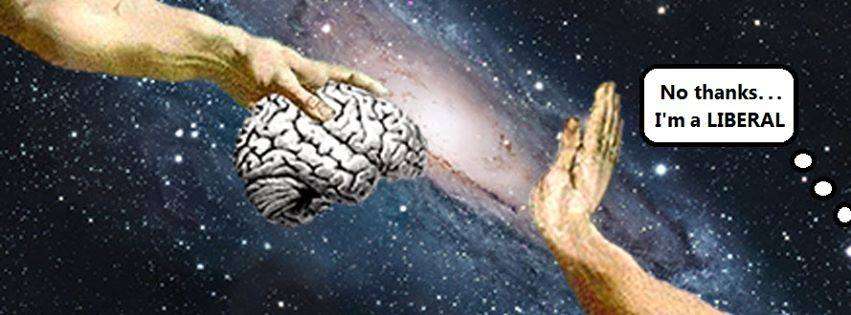The Hill, via Weasel Zippers, via Fox, via Steven Goddard:
Former vice president Al Gore on Monday called for making climate change “denial” a taboo in society.
“Within the market system we have to put a price on carbon, and within the political system, we have to put a price on denial,” Gore said at the Social Good Summit New York City.
“It is simply not acceptable for major companies to mimic the unethical strategy of the tobacco companies in presenting blatantly false information in order to protect a business model,” Gore added, alleging that’s what some oil and coal companies are doing. “There needs to be a political price for denial.”
:
He urged attendees to challenge denial of climate change in conversations in families and communities and elsewhere. “We can win this conversation and winning a conversation can make all the difference,” Gore said. “Don’t let denial go unchallenged.”
Gore noted how racism and later homophobia have become increasingly unacceptable.
He pointed to news accounts of an instance in which two gay men were subjected to anti-gay insults by another customer in line at an Ohio pizza spot.
The other people in line and the employees uniformly condemned the insult, according to reports.
Article goes on to provide a link to the Ohio/pizza/gay story, according to which…
Two gay men stopping for a late night slice of pizza in Columbus, Ohio unexpectedly received a heartwarming show of community support when confronted with a hateful tirade.
Joel Diaz and Ethan White were holding hands and waiting in line at Mikey’s Late Night Slice pizza truck last weekend when another customer told them to cut out their “gay s–t,” the pair told Huffington Post.
“I was a bit startled by his words, but I didn’t expect what happened next. Almost every single person in that line made it known to him it was not OK for him to speak to us like that,” said Diaz.
Unfazed, the man continued his homophobic rant, Diaz said.
Other customers, both gay and straight, continued to argue with the man, but it was actually the employees of the pizza truck that finally squashed the situation.
:
“The guys who work the truck stopped what they were doing and leaned towards the window and told him they would not serve him because he was spewing hate. They said they support everyone in our community and that he should get out of line because they would not be serving him,” Diaz said.
The man finally left, and moved by the incredible support from his community, Diaz posted about the experience on Facebook.
Thousands of shares later, Mikey’s Late Night Slice also chimed in saying the company can’t “tell you how proud we are of our truck workers that night for speaking up and doing the right thing.”
What fascinates me most about this is the obvious flaw in Al Gore’s comparison. The pizza thing is a classic case of “tolerance in the form of intolerance toward intolerance.” Therein lies a complex and most worthwhile debate, I think, about whether that can actually work. Maybe I’ll leave that for some other forum. Or not. But at any rate, before we disappear down that bunny trail, let us first inspect this fragile connection between crowd-shouting-down “his homophobic rant,” and doing the same thing against what the former Vice President calls “denial” against the climate change scam.
The tactic is the only connection between the two situations. That, and the lust behind it. There’s no other tie, at all. And I can say that without knowing much of anything about this “rant.” All I really know about it is that it seems to have started from the PDA, so the rant must have been about what the guy didn’t want to see in public. The hand-holding got to him. I mean, that’s what he said, according to the story. Dissent against the weird climate-change power play stuff, on the other hand, has nothing to do with that at all.
The climate-change snake oil has been sold, a lot of people aren’t buying it, because to be frank about it the sales job we’ve seen across the decades leaves a whole lot to be desired. It’s full of obvious fibs, tainted information, thoroughly corrupted peer-review processes, contradictions, institutional arrogance and other red flags. It relies on snobbery, buffoonery, selfishness and intellectual laziness; even with all that, a lot of climate change dissenters would suffice with an eyeball roll, standing quietly by on the sidelines while the alwarmists continue to hog the limelight and insist on the final word and make asses out of themselves, except for one thing. It has become clear that the outcome is likely to be determined by a shouting match, like it or not. So it doesn’t do any good to quietly mutter to oneself, “I’m on to that Al Gore guy, I’m not falling for this.”
Unknowns are being falsely characterized as knowns. While that’s going on, the alwarmists are making noises about moving money around. We’re talking huge, big money; it’s a trillion-dollar scam. Those who can see this is happening, have to get out, and speak up. Professional hysterics like Al Gore put us into that position.
In fact, if his analogy works at all, it’s people like Al Gore who are the homophobic guy because they’re the ones causing the original offense, trying to usurp unilateral control over the prevailing viewpoint. To run a successful business that employs people and has a beneficial effect on the economy, would be like the holding hands. “Cut out that gay shit” is essentially the same message, is it not, as “cut out that carbon-emitting shit”? And the skeptics are like the rest of the crowd, and the truck guys, delivering the message: Uh no, if we’re settling this by majority rule, a dubious proposition at best, you didn’t characterize that majority-rule fairly just now, and we’re here to make sure you know that.
But of course, you don’t vote on the freezing temperature of water. We don’t conclude things based on one faction deliberately and methodically eliminating from the discussion anybody who doesn’t go along — although it is nice to have Mr. Gore on record as saying, that’s how he wants to “win this conversation and winning a conversation can make all the difference.” I have often thought that the toddler-desire to win-all-arguments was at the center of this whole thing, and ice core samples and satellite radiation measurements never had anything to do with it. Now that there is proof, I’m not surprised. This isn’t climate science, it’s a behavioral disorder we’re seeing play out. Psychology has a lot more to do with it.
If there’s a hitherto undiscovered and undiagnosed disorder playing out, Popular Science magazine (via CNET) must have it. They’ve just shut down their comment section. Suzanne LaBarre, online content director, put up some explanation as to why:
…even a fractious minority wields enough power to skew a reader’s perception of a story, recent research suggests. In one study led by University of Wisconsin-Madison professor Dominique Brossard, 1,183 Americans read a fake blog post on nanotechnology and revealed in survey questions how they felt about the subject (are they wary of the benefits or supportive?). Then, through a randomly assigned condition, they read either epithet- and insult-laden comments (“If you don’t see the benefits of using nanotechnology in these kinds of products, you’re an idiot” ) or civil comments. The results, as Brossard and coauthor Dietram A. Scheufele wrote in a New York Times op-ed:
Uncivil comments not only polarized readers, but they often changed a participant’s interpretation of the news story itself.
In the civil group, those who initially did or did not support the technology — whom we identified with preliminary survey questions — continued to feel the same way after reading the comments. Those exposed to rude comments, however, ended up with a much more polarized understanding of the risks connected with the technology.
Simply including an ad hominem attack in a reader comment was enough to make study participants think the downside of the reported technology was greater than they’d previously thought.
Another, similarly designed study found that just firmly worded (but not uncivil) disagreements between commenters impacted readers’ perception of science.
If you carry out those results to their logical end–commenters shape public opinion; public opinion shapes public policy; public policy shapes how and whether and what research gets funded–you start to see why we feel compelled to hit the “off” switch.
A politically motivated, decades-long war on expertise has eroded the popular consensus on a wide variety of scientifically validated topics. Everything, from evolution to the origins of climate change, is mistakenly up for grabs again. Scientific certainty is just another thing for two people to “debate” on television. And because comments sections tend to be a grotesque reflection of the media culture surrounding them, the cynical work of undermining bedrock scientific doctrine is now being done beneath our own stories, within a website devoted to championing science.
It’s a good argument if, and only if, her concern is limited to “trolls,” and if it is truly mistaken to have these things “up for grabs again.” But as one of my friends pointed out on the Hello Kitty of Blogging…what are we to make of it when there is a debate going on, and one side of the debate starts manipulating these control levers to shut the debate down? What are we to think?
If I had a dime for every time some pious organization said that the “science” is settled, that there is no room for debate, as if that were the period at the end of a very long sentence nobody actually remembers reading, I’d be obscenely rich by now. And then a week later, science would say, no, turns out eggs are good for you and not cholesterol-laden death.
My perspective is that nothing is settled if you can’t, or won’t, make the case for it, and then defend it against opposition. And here, “Popular Science”, which by virtue of eliminating reader comments, now has one less way to tell just how popular their “science” actually is, just pulled a “the debate is over and we’re right–no reason for further discussion” card out of the deck.
:
If I’m on the fence on a controversial issue, what am I to make of the side that shuts down debate, versus the side that wants to actually have a conversation? If global warming, for example, is such a given, then why can’t the following questions be fielded in a maturely scientific manner:
Why is the entire theory predicated on doctoring numbers (throwing scalars on top of actualized data to create the infamous “hockeystick graph” that started it all)? Or why has there been a systematic suppression of contrary evidence (Climate-Gate)? Why are the models constantly being tossed out and rebuilt to fit the current weather patterns instead of the forecasted warming projections we were told were inevitable? Why did the name change specifically from “global warming” to an amorphic “climate change,” if the underlying theories in the original models were sound and specific enough on which to base public policy? Where’s the null hypothesis, if both hot and cold weather point to the same conclusion? Why has the so-called warming trend been flat (and even inverse) in the last fifteen years? So if it’s hot, if it’s cold, or if temperatures don’t change much (are flat), then it’s all because of global warming/climate change/whatever it’s called next?
I guess I shouldn’t bother asking because it turns out we’re all too dumb to understand, or that some among us might make pejorative comments on a website that might sway others against the “settled science”. So the discussion isn’t worth having. It can’t be that what’s passing for popular science nowadays is devoid of true scientific methodology, but is instead, fueled by a tribal-driven false consensus and political expediency. No, that’s not it. We just can’t be trusted to be a part of the discussion, and I’m fine with that.
Which leads us to an overdue inspection of the idea that the alwarmists have a better command of the “science.” This was dealt a blow recently during a Q&A session with noted and outspoken alwarmist David Suzuki (via Herald Sun, via Instapundit).
BILL KOUTALIANOS: Oh, hi. Since 1998 global temperatures have been relatively flat, yet many man-made global warming advocates refuse to acknowledge this simple fact. Has man-made global warming become a new religion in itself?
TONY JONES: David, go ahead.
DAVID SUZUKI: Yeah, well, I don’t know why you’re saying that. The ten hottest years on record, as I understand it, have been in this century. In fact, the warming continues. It may have slowed down but the warming continues and everybody is anticipating some kind of revelation in the next IPCC reports that are saying we got it wrong. As far as I understand, we haven’t. So where are you getting your information? I’m not a climatologist. I wait for the climatologists to tell us what they’re thinking.
TONY JONES: Do you want to respond to that, Bill?
BILL KOUTALIANOS: Sure, yeah. UAH, RSS, HadCRUT, GISS data shows a 17-year flat trend which suggests there may be something wrong with the Co2 warming theory?
DAVID SUZUKI: Sorry, yeah, what is the reference? I don’t…
BILL KOUTALIANOS: Well, they’re the main data sets that IPCC use: UAH, University of Alabama, Huntsville; GISS, Goddard Institute of Science; HadCRUT. I don’t know what that stands for, HadCRUT; and RSS, Remote Sensing something. So those data sets suggest a 17-year flat trend, which suggests there may be a problem with the Co2.
DAVID SUZUKI: No, well, there may be a climate sceptic down in Huntsville, Alabama, who has taken the data and come to that conclusion. I say, let’s wait for the IPCC report to come out and see what the vast bulk of scientists who have been involved in gathering this information will tell us. You know, we can cherry pick all kinds of stuff. Cherry pick, in fact, the scientists that we want to listen to, but let’s listen to the IPCC
TONY JONES: David, this is one of the most frequently asked questions or claims made by climate sceptics: a global temperature spiked in 1998 and since then have plateaued, even though they remained at very high levels, as you said, over the 10 years.
DAVID SUZUKI: Yeah.
TONY JONES: It is a problem, isn’t it, explain that, for scientists?
DAVID SUZUKI: Well, what’s the problem? I mean they’re concluding still the warming…
TONY JONES: Well, the problem is it didn’t actually get warmer when people expected it to?
DAVID SUZUKI: Well, as far as I understand it is getting warmer, so I don’t know what the disagreement is there.
There’s a lesson here. I’ve said it before but I’ll go ahead and say it again: Learning, as in changing your behavior non-instinctively as a result of getting wiser/smarter, is achieved by way of accumulating information. You don’t get smarter by removing information. You may achieve greater dexterity in determining the form and shape of the final conclusion by doing that…hence the temptation. There is a temptation there for people who already know what they want to have done, and can’t be bothered with the facts. They tend to want to get “smarter” by throwing away information, making themselves dumber. To them, it makes sense. You make a pencil sharp by removing whatever isn’t part of the “point,” right?
Their justification for throwing away information and acting as if they’re getting smarter by doing so, is that the information they’re throwing out is bad. There is some merit to this, but if that is the concern then the answer is to keep adding information. The fact that such-and-such a piece of information is bad, is in itself more information, right? This is demonstrable when you start to get quizzed about why the first piece of information was bad. As Suzuki most ably showed, when you’re asked this and you can’t answer, because you’ve been playing this little game of “it doesn’t fit my narrative so out it goes” — you don’t look very smart, and there’s a reason for that. People don’t get the feeling they’re getting any smarter by listening to you. Because they aren’t. In that situation, you have nothing to add to a real conversation.
This is the problem, I think, with the former Vice President’s advice. It’s a problem staining the entire climate-change boatload of power-mongering, media-manipulation and snotty condescension, stem to stern. Lately it’s become a constant thing — they can “win” all the arguments, provided there is nobody else participating in those arguments. I imagine that must feel pretty satisfying. It’s always fun to tell the people who disagree with you, or are merely asking unwelcome questions, begone & don’t let the doorknob hit ya where the Good Lord split ya. Winning arguments is fun! But this doesn’t bring you any closer to the truth when it’s done this way. And that matters, in ways that are actually important, to all of the rest of us.
Ignorance is ignorance. Blocking out information makes you ignorant. I know a lot of people think it’s somehow more complicated than that…but I don’t think so. I doubt that even after listening to and reading all they’ve had to say about it, which is something I notice they’re not willing to do with the arguments of others.
Al Gore’s whole point was to not let climate change denial go unchallenged. That must mean spread ignorance; David Suzuki showed how to do this, and since his knowledge is incomplete by way of stenciled selection, he was left just stammering “I don’t know where you’re getting that” over and over again. The alwarmists are constantly telling each other, and everybody else, not-to-listen to such-and-such, not-to-read such-and-such. From that, I conclude that the way Suzuki did it, is the way it’s supposed to be done: Tell everybody how to remain ignorant, and then keep doing it, over and over again.
They may think that has something to do with “science.” I have a different meaning in mind.



















 Only a woman can make things work in the kitchen — good. A woman’s place is in the kitchen — that’s bad. Very, very bad. Can’t say that. Sometimes differences are good, sometimes they’re bad, if ever you’re in doubt just ask yourself if your comment would make a feminist smirk, full of haughtiness, self-righteousness, and smarmy glee churned up with just a touch of ritual righteous indignation. If it does that, then it’s “okay” to say it in mixed company, otherwise keep your dumb retrograde chauvinist monkey-face mouth shut, you sexist hater you. Notice the differences when the differences put women on top. All other times, it’s back to “pretend men are just hairy women with a different way to pee sometimes.”
Only a woman can make things work in the kitchen — good. A woman’s place is in the kitchen — that’s bad. Very, very bad. Can’t say that. Sometimes differences are good, sometimes they’re bad, if ever you’re in doubt just ask yourself if your comment would make a feminist smirk, full of haughtiness, self-righteousness, and smarmy glee churned up with just a touch of ritual righteous indignation. If it does that, then it’s “okay” to say it in mixed company, otherwise keep your dumb retrograde chauvinist monkey-face mouth shut, you sexist hater you. Notice the differences when the differences put women on top. All other times, it’s back to “pretend men are just hairy women with a different way to pee sometimes.” I don’t think we can lump them all together. Theirs is an ideology built on deception, and where you have deception you must necessarily have deceivers and deceived people. Where you have those, you have different factions of people toiling away working toward different goals, with different priorities. At least two sets; two at the very least. Were they truly unified, there wouldn’t be any need for deception.
I don’t think we can lump them all together. Theirs is an ideology built on deception, and where you have deception you must necessarily have deceivers and deceived people. Where you have those, you have different factions of people toiling away working toward different goals, with different priorities. At least two sets; two at the very least. Were they truly unified, there wouldn’t be any need for deception. I completely understand the concerns of people who respond in the negative, for sake of something called “peace.” Well here’s another question: When you sacrifice something for peace, but swear you’ll always honor the memory of whatever you’ve sacrificed for it, and then the period of peace eventually ends as so many eras of peace in human history have; hasn’t this immortal memory then been effectively obliterated? Robbed of its supposed immortality? And if that be the case, would this not be a betrayal? Aren’t these all things that should find consideration within us, as we ponder the price of the latest peace?
I completely understand the concerns of people who respond in the negative, for sake of something called “peace.” Well here’s another question: When you sacrifice something for peace, but swear you’ll always honor the memory of whatever you’ve sacrificed for it, and then the period of peace eventually ends as so many eras of peace in human history have; hasn’t this immortal memory then been effectively obliterated? Robbed of its supposed immortality? And if that be the case, would this not be a betrayal? Aren’t these all things that should find consideration within us, as we ponder the price of the latest peace?